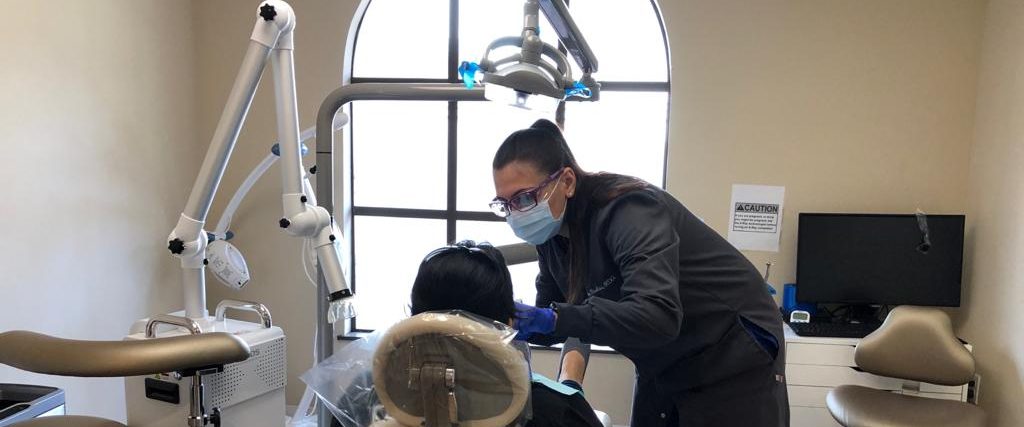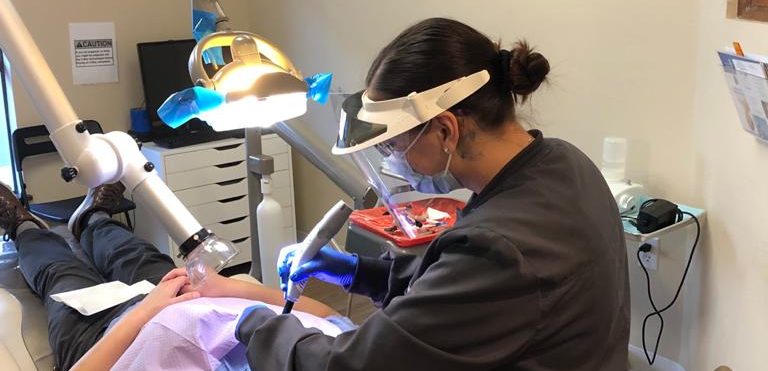Date : 05/09/2020
Oral health is an often overlooked aspect of our overall health. You might think that as long as you're brushing and flossing regularly, that's enough to keep your mouth in tip-top shape. When in reality, you may need a deep cleaning for the health of your teeth and gums.
Deep cleaning isn't a common term you hear when talking about your oral health. You might even be wondering what the heck a deep cleaning for your teeth is. We'll help you get a better grasp of this dental procedure as well as reasons your dentist may recommend one for you.
What You Need to Know About Deep Cleaning
Deep cleaning teeth is a hygiene method in which your dental professional removes any built-up plaque that has accumulated at the base of your teeth. The gum line is a critical area of the mouth where regular brushing can rarely clean well enough.
Deep cleaning is also sometimes referred to by its technical name of surgical periodontal therapy. You may have also heard this procedure called scaling or even root planing.
Professionals use these terms to describe the different phases of the entire process. Deep cleaning teeth must be performed by a dental professional. You'll need to make an appointment with your dentist or hygienist. The good news is, many forms of periodontal disease can be corrected or avoided by getting a deep cleaning procedure.
Health experts estimate that 47 percent of Americans have some form of periodontal disease. Scaling or deep cleaning teeth can help alleviate this potentially devasting condition.
What to Expect with a Deep Cleaning
Your dentist will clean along the gum line and even around the roots of your teeth. In most cases, your dentist will perform this procedure in four separate phases. The phases are done in conjunction with the four sections of the mouth: the upper right and left sides and the lower right and left sides.
The length of time that it takes to complete a deep cleaning on your teeth will largely depend on how much plaque has accumulated on your teeth and along your gum line.
During your visit
As we mentioned, you're going to need more than one visit for your deep cleaning. That's because your dentist needs to complete this procedure slowly, so they don't traumatize your gums too much at once.
Your dental professional will numb the area of the mouth that is about to be worked on. The only pain you should feel during this procedure will be during the numbing process.
The process
After you are comfortably numb, your dental professional will begin using a selection of unique instruments to remove built-up tartar and plaque. Sometimes pockets of plaque and infection can collect. Removing this from your gum line will be of utmost importance to prevent future infection.
Next, your dentist will begin the root planning. During this part, the dentist smooths the roots of your teeth so that your newly cleaned gums can reattach to the roots. At the end of the visit, your dentist will apply a gel to your teeth to help protect your teeth from cavities.
Post-procedure care
Following your procedure, there will be a few steps you should take as your gums recover. Your dental professional may give you a special mouthwash to use post-procedure.
It's imperative to follow your dentist’s instructions precisely.
At this point, you should start your new dental hygiene program. If you want your deep cleaning to have the most effect, you must follow up with stringent dental hygiene. A deep cleaning is not a miracle procedure. The fact is, you have work to do, and following the procedure is when the real work begins.
Your gum disease can make a comeback if your dental hygiene habits disappear. So, let the deep cleaning procedure be the start of a better regime of personal dental hygiene.
Your oral health care should now include brushing twice a day and flossing regularly. Also, using a good anti-cavity mouthwash and visiting the dentist every six months can make a real difference.
Oral Health and Gum Disease
Many people don't realize that gum disease can often go unnoticed. They mistakenly think they'll know if they have gum disease. After all, your gums will bleed and hurt. Right?
The truth is, those symptoms are usually only present in very advanced stages of gum disease. You can catch it much earlier than that.
Types of gum disease
Not all gum diseases are created equal. There are actually different types.
The earliest stage of gum disease is the commonly-known gingivitis. Gingivitis is usually the result of bad oral hygiene. This condition will often cause the gums to seem red. They can also swell.
Many people might also experience bad breath. Some people experience bleeding and pain. However, you should note that not everyone experiences these symptoms. Some people don't experience any pain, so the gum disease can go undetected.
Here's the good news: You can usually reverse gingivitis with better oral hygiene practices and deep cleaning your teeth. But if you don't have your gingivitis treated adequately, it can develop into periodontitis -- a much more serious condition.
With periodontitis, the gums begin to withdraw from the teeth. When this happens, pockets of plaque can begin to develop. This is the stage at which your teeth are at most danger for decay and bone loss.
Preventing gum disease
In order to keep gingivitis from turning into periodontitis, deep cleaning your teeth may be necessary. Plus, you will need to approach your hygiene in three ways.
- First, your personal dental hygiene at home must be very carefully maintained. This will include regular brushing and flossing.
- Next, you should also reduce any risk factors that might be present. Factors, such as smoking and bad eating habits, can both contribute to gum disease.
- And finally, visit your dentist regularly. That will help reduce your chances of gum disease.
Top 3 Reasons to Have a Deep Cleaning Done
You've taken care of your teeth at home, and maybe it's just not enough. Or perhaps you've neglected your oral health, and you're ready to turn things around. In either case, we have the top three reasons you should consider a deep cleaning.
Reduce gum disease
We touched on this, but it bears repeating. Deep cleaning the teeth is normally done for individuals in which gum disease is already present.
This treatment goes beyond standard dental cleanings and addresses the causes of gum disease. The fact is, once gum disease has set in, you can begin to lose tooth enamel and even bone. Deep cleaning teeth can help slow or even stop this process altogether.
Prevent bone loss
Few people realize that one side effect of gum disease can be bone loss. Whenever infection or decay is present, it can spread to the bones. And often does.
Once exposed to the infection, the bone can also become infected. And if the infection is too extreme, bone loss can result. Once the tooth decay has gotten this severe, recovering the tooth or the bone is very difficult. A deep cleaning will help keep your oral health from deteriorating to this level.
Improve bad breath
Accumulated plaque and tartar can often contribute to bad breath. Despite brushing, flossing, and even using mouthwash, it can be difficult to get rid of this bad breath.
Here's the reason: The plaque and infection lie beneath the gum line where brushing and flossing won't help. The only way to remove the bad breath associated with this plaque is to remove the plaque itself.
Deep cleaning teeth professionally can help you finally get a grip on your bad breath issues as well as improving your overall oral health.
Make a Decision and Be Proactive
Many people are hesitant to schedule a deep cleaning procedure recommended by their dentist. Maybe they're scared or are afraid they can't afford it, but those shouldn't be deciding factors.
The bottom line is, if you begin to lose bone, you will wind up spending a lot more on your oral health in the long run. On top of that, the treatments will be more severe.
In many cases, your dental insurance will cover the cost of deep cleaning teeth, as it is often necessary for long-term oral health. Plus, Many dental offices provide payment plans to help make this process more doable.
And the fear? Well, you just have to hit that head-on. Remember, your dentist is there to help you will all your dental needs. So, if this is a need, seek them out.
You have to take the first step. The only way to discover is deep cleaning is right for you is to discuss this procedure with your dental professional. So, make the call today. The team at Your Caring Dentist Group specializes in working with patients with dental phobia. They can help you get your gums back in shape while addressing any anxiety you have.
Do you suspect you need a deep cleaning? What's holding you back? Tell us about it in the comments!




